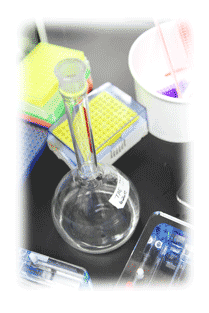Master of Science in Natural Sciences


The Department of Life and Physical Sciences offers a Master of Science in Natural Sciences degree with both thesis and non-thesis options. This program can be tailored to both part-time and full-time enrollment needs. Students choosing to complete an M.S. in Natural Sciences will experience many benefits including increased research options, individualized coursework and rewarding advancement opportunities. The small student to teacher ratio also ensures that strong, professional relationships are established for more meaningful advancement opportunities.
thesis and non-thesis options. This program can be tailored to both part-time and full-time enrollment needs. Students choosing to complete an M.S. in Natural Sciences will experience many benefits including increased research options, individualized coursework and rewarding advancement opportunities. The small student to teacher ratio also ensures that strong, professional relationships are established for more meaningful advancement opportunities.
The M.S. in Natural Sciences has an integrated core of classes, but allows for personalization based on students' career tracks and interests. Whether you choose to bridge to a doctorate program or seek advancement with an employer, graduates of this program are prepared with an affordable, quality education.
Admission Requirements
- All students must meet the general criteria established by the Lincoln University Graduate Studies Program and submit the required documents
- GRE 800 (combined)
- GPA 2.75 overall or 3.0 in major courses (undergraduate)
- Baccalaureate degree in science or baccalaureate degree requiring at least 12 credit hours in science at the junior or senior level
Degree Requirements
Advising
Students admitted as regular degree-seeking students will be assigned advisors based on recommendation from the Life and Physical Sciences graduate committee. Students admitted as non-degree seeking students will be advised and registered in the Graduate Office. As soon as possible, the student should contact their assigned advisor to complete the Graduate Approved Program (GAP) form. The GAP form is required to be submitted upon completion of at least 12 hours and not more than 24 semester hours of credit.

Program of Study
Students may select a primary emphasis in biology, chemistry or physics or they may choose an interdisciplinary or cross-curricular tract. The GAP form must be approved by the advisor and the department head of Life and Physical Sciences prior to submission to the Dean of Graduate Studies for approval. The student should follow the approved GAP in arranging course schedules. A change in the GAP may be initiated by the student. A revised GAP must be approved by the advisor, department head and Dean of Graduate Studies.
Grade Point Average
In order to qualify for graduation, a student must have a minimum overall average of 3.00 ("B") on a 4.00 scale. No course in which the student has earned less than a grade of "C" may be counted toward the degree.
Time Limit
All requirements for the graduate degree must be completed within 5 years, beginning with the date the student commences graduate courses after having been unconditionally admitted to the program.
Course Requirements
The MS in Natural Sciences degree requires a minimum of 30 credit hours for completion. All students must take the 12 credit hour core curriculum.
Core Curriculum
SCI 501 Graduate Seminar in Natural Sciences (1 cr. hr.) repeat for 3 cr.
SCI 502 Introduction to Professional Laboratory Practices (3 cr. hr.)
SCI 503 Experimental Design and Analysis in Natural Sciences (3 cr. hr.)
SCI 504 Instrumentation in Research (3 cr. hr.)
Research Requirements

Thesis Option
The thesis option requires the completion of a research thesis supervised by the student's advisor and an approved thesis committee. The Thesis Advisory Committee is composed of at least three members, two of whom must be from the graduate faculty and one from an area outside the student's major discipline. The thesis shall be approved by the advisory committee and by the Dean of the College of Graduate Studies before the degree is granted. A maximum of nine credit hours of thesis credit can be applied toward the 30 hour minimum degree total.
Non-Thesis Option
In addition to the required 12 credit hour core, non-thesis students must take an additional 18 hours of graduate coursework. Within this additional 18 hours at least three credit hours must be in courses open only to graduate students.
The non-thesis option also requires students to take a comprehensive examination. The student must initiate the process, contact his/her advisor to select the examining committee, complete the Comprehensive Examination Evaluation Form, and submit the signed, completed form to the Graduate Office by the deadline established in the Academic Calendar. The graduate advisor in consultation with the student will select the other two members of the three-member examining committee. No more than one member of the committee may be an adjunct faculty member.
